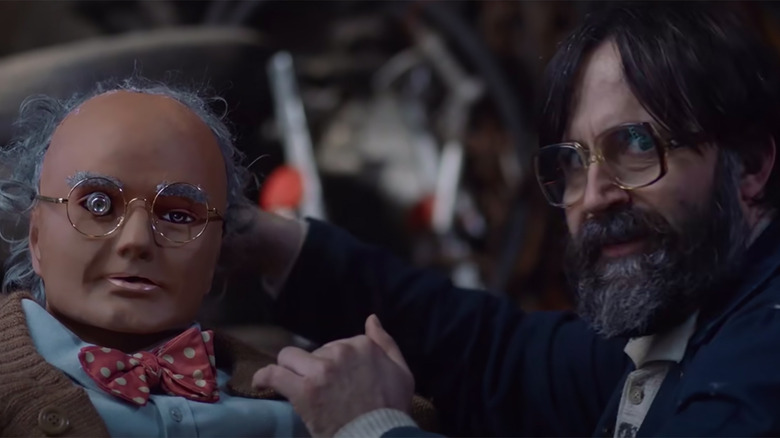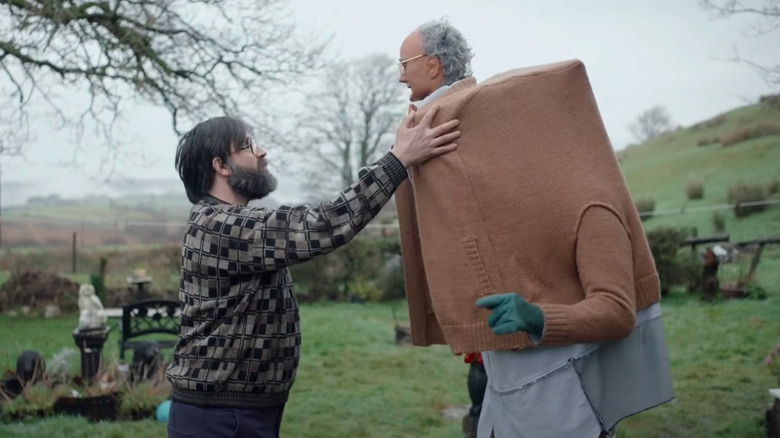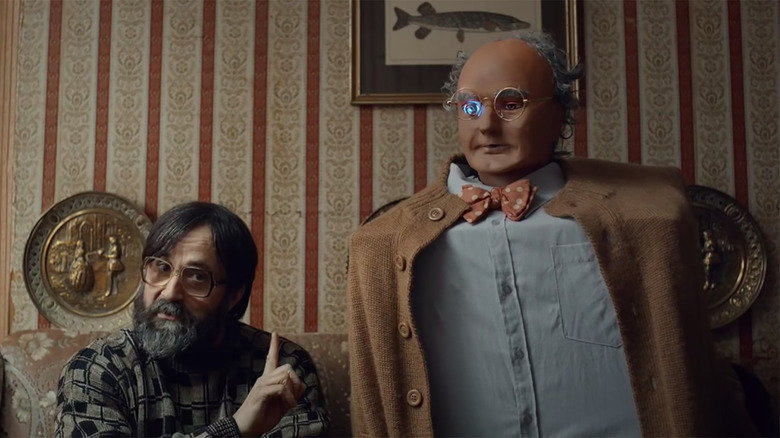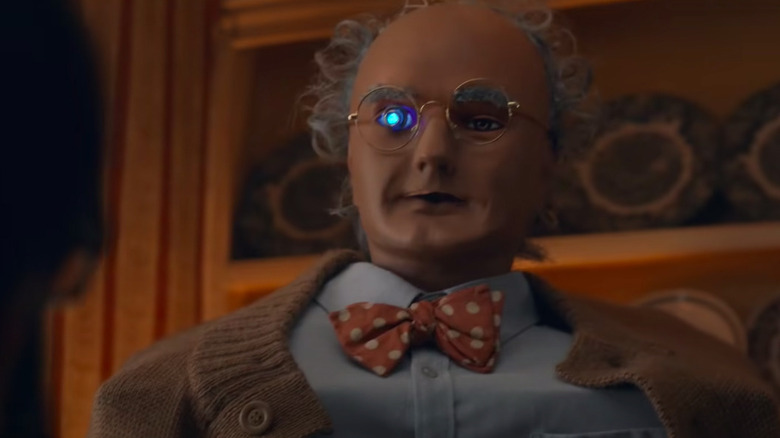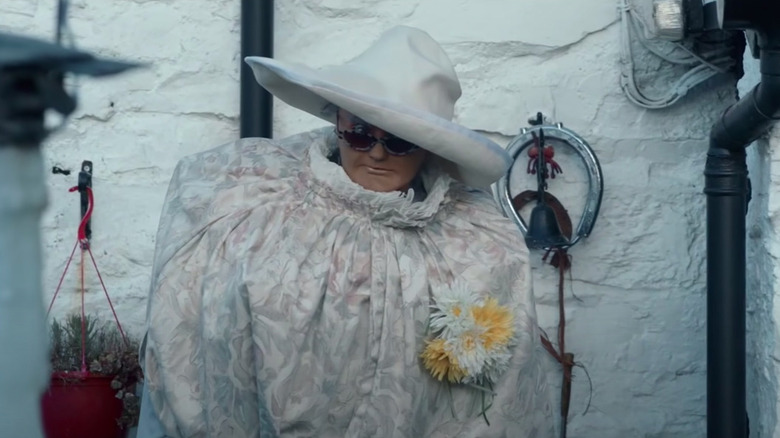Brian And Charles Director Talks Refreshing The Mockumentary Format, Deleted Scenes & More [Interview]
The indie darling "Brian and Charles," a buddy comedy about a reclusive inventor (David Earl as Brian) and his makeshift robot (Chris Hayward as Charles), was picked up by Focus Features after premiering at the 2022 Sundance Film Festival, and it arrives on the big screen today. Behind the camera as director is Jim Archer, who also was at the helm of the 2017 mockumentary short film that inspired the feature adaptation. Archer has been working with Earl and Hayward for years now, but the characters of Brian and Charles had a rich history on the radio and improv stages before that. Speaking with Archer ahead of the film's theatrical release, we talked about collaborating with Earl and Hayward, developing the story, scenes that didn't make the cut, different versions of Charles, and much more.
'The whole backstory changed completely'
First, I want to say that I love "Brian and Charles." To begin, I wanted to ask, how long have you been working with Chris and David? I saw that you've done other shorts with them before, so I wanted to find out more about your collaborative history.
To be honest, I've been working with them since we made the ["Brian and Charles"] short, since we got together to think about it in 2016. I'd known Chris a bit longer, just through the UK comedy world and Rupert [Majendie], the producer, I knew him for a similar amount of time, but I think our first foray into creating stuff together was the short film.
So what's it like collaborating with them? Because they've been doing these characters for a long time. How do you jump in and start crafting something that's new with these characters that they've honed for years?
When I read the script, I was like, "Well, this is already so different." The characters on stage are sort of ... it's chaotic and there's very little backstory. Brian's this sort of bad stand-up character. And then [it became] this thing where he going to be this lonely guy who builds a robot to keep himself company. I thought, "This feels totally different." So then we were talking about, when we move it to Wales ... put it in that context, and suddenly Brian's character changes even more. So I think it was a little bit shaping it like that. Take a few of the edges of him, Brian specifically, and just make it feel that it makes sense. [Then] we just need to create a new backstory, essentially.
Right.
I think the version of Brian from our films is only similar in sort of voice and glasses and beard [when compared] to the one on stage. The whole backstory changed completely.
'We were moving stuff that was 60 minutes into the film into the first five minutes'
Since this is your first feature film, did you find anything particularly challenging as compared to working on short films?
Yes, certainly. Just the length of it is harder, but I guess, specifically working in Wales. We had a three-day run of night shoots where the weather was just horrendous. That was kind of our biggest physical challenge.
Then just the challenge of how much you can sort of recreate the story from scratch in the edit. That was completely new to me, when you have that much to work with. By the end of it, we were moving stuff that was 60 minutes into the film into the first five minutes. Then, once we did that, everything was off the table now. We could move anything anywhere, and we really did. We cut big scenes that we thought were pivotal to the film. It's starting again and being like, "Okay, well, what can I make out of this footage?" It was a lot of fun.
What were some of those big storylines that ended up being cut out?
We had a Hazel [storyline] with her mom where Lynn [Hunter], who plays her mom, had an amazing scene where they kind of fight, not physically fight, but we see Brian watching from another room, and we see why Hazel is so beaten down. But I think it distracted from the story of Brian and Charles, and it felt [like] we tacked it on. So we lost that, and I think you kind of feel that anyway. You get that feeling that Hazel has an imposing figure in her mother. We felt that we almost didn't need to spell it out too much. Also there's way bigger things we cut. Charles died for 10 minutes halfway through.
Wow!
We meet Eddie. There's a proper "meeting Eddie in a thunderstorm" scene that we cut because, again, [those] things just slowed it down ... that was my favorite scene to shoot, was that Eddie scene, and telling Jamie that we cut it was quite hard because we were standing in the rain for seven hours. But in the end, it was the right thing for us to do for the story.
'This is the real opportunity to play with that formula ... and progress beyond 'The Office' and 'Spinal Tap' versions of mockumentary'
What were some of your cinematic influences going into this? Which movies were a frame of reference for the kind of movie that represented the tone and style?
There were a few things. Me and the [director of photography] watched a lot of cinematic docs, and I think the influences for David and Chris were all very ... they watched documentaries, but they were much more about character and stuff, which I also watched as well, to get those influences. But there's a film called "Sleep Furiously," which I bet no one's seen. It's a documentary set in Wales, and it's kind of about nothing, really. It's lots of shots of Welsh landscape with ambient kind of Aphex Twin music over the top of it. It's just interesting how much they could tell story through just really long shots. So I was really interested in that. I thought, "Oh, I'd love to bring some more of that into the film." Because it was a documentary set in the same kind of place. And then other documentaries that I've been watching that I can't really think of off the top of my head. Then the more kind of action films like "E.T." or even "Wallace and Gromit" was an influence for this sort thing.
Was there ever any discussion about not doing the feature in mockumentary style, even though the short was in that style?
Definitely. For the short, we never really discussed it. That was how it was written. So, that was how we could do it, and I was excited by that because I thought, "Oh, well we can make a documentary. We can make a mockumentary in a sort of new style that I hadn't seen before. Let's make it like these proper kind of artsy docs," which I felt comedy hadn't utilized yet.
When we made the feature, I was keen to not do that. But as we progressed, we realized how that documentary format would actually poke holes in Brian's story, when he's trying to talk to camera and explain that he's okay and he's happy. This is his life in those first 10 minutes. The documentary format really helps you realize he's just lying to you, and you can't really present that in any other way.
So that was our main reason, and then I just got excited again, like, "Oh yeah, this is the real opportunity to play with that formula and advance it and progress beyond 'The Office' and 'Spinal Tap' versions of mockumentary. Let's make a 2022 version of that."
'We had multiple boxes. We had about six different heads'
How many different versions of Charles were there? Not necessarily versions, but I assume you had to have multiple prop versions just in case. Because there's that one part in the film where he's dancing on the stool and he falls, and it looks like part of the box kind of implodes upon itself. So I imagine you guys had a bunch of Charles.
Yeah, we had multiple boxes. We had about six different heads, I think. Because, when we got the green light from Film4, I just went online and immediately bought as many of those heads. There aren't many that are exactly the same as the Charles we did from the short. So I reversed Google image searched the head, found six on eBay and just bought them.
But we had other versions, too. All of this stuff got cut from the film. Like when Charles died, he vomited oil, and there's another scene where he vomits oil when he's at Eddie's farm. We cut both those things because it just didn't look right. It looks a little gross. There's a scene when Brian talks about how he came to life, the mouse crawling on the wires. We actually had a scene with a mouse coming out of his mouth. But again, it was kind of disgusting and just visually, because we like to do everything in camera, we didn't want to do any VFX stuff. It didn't quite work. So to be honest, in the end, the only heads that make it into the film are probably the main talking heads, which are probably two of them.
I wanted to talk about working with Daniel Pemberton, a great composer. Obviously, he did some incredible work on "Spider-Man: Into the Spider-Verse," and he made this wonderful little synth score for you guys. What was the process like working with him?
We were so blown away that he was in interested in doing it. We got the call from our music supervisor David [Fish], he said, "Look, this guy Daniel's super interested in doing it." And normally we wouldn't be able to afford him, but, I think he responded to it as something he could do, the kind of music he made when he was coming up as a composer. I think he started when he was 16 or something, and to do this sort of synth-y movie kind of stuff, he just played us some stuff when we Zoomed him, and I was just so into it and just so excited about it. He just totally got the tone of the film straight away, because we wanted to do this sort ambient stuff, but also this kind of British pastoral kind of whimsical thing at the same time. So yeah, it was a lot of fun. I went to his flat and it's just sort of synths everywhere, and we just recorded some stuff. Then he recorded onto tape, and then back again, and we got all this kind of warped kind of sound. It was a lot of fun. We're very lucky to have him.
'Shoot stuff, and then people will come'
How did that rap with Charles come together in the credits? That's so good.
Yeah, that was actually Daniel's idea. I think Chris wrote the rap, but Daniel said, "Hey look, the song's going to finish here on the credits, the end song, so we've got two minutes to do another song. Why don't we do a rap?" And we just loved that idea. So he wrote the beat, and then Chris just wrote the lyrics, and then we went away.
Were you privy to any of the challenges of writing that? Because I imagine it was maybe a little bit difficult to have the rhythm of the lyrics match the song when you have to use this computer voice that doesn't necessarily vary the speed of how it says words.
Well, we can vary the speed...
Oh, gotcha.
That is part of the formula. Although, I think we cut everything in the film where we do the slow down or speed up. There might be the odd thing in there, but you can speed it up as much as you want, and slow it down. So it's really weird, but I can't remember how we actually did that. I reckon maybe Chris wrote the lyrics and then we gave Daniel the software so he could make it targeted to the beat. I don't know. But anyway, it worked out.
That's pretty great. So now that you have this first feature under your belt. Do you have any sort of grand ambitions on what you would like to tackle next?
Yeah, I want to stay in film. I've just done a TV show that was out here [in the UK]. So that has gone down really well. I'm interested in TV too, but film is where my heart is. So stuff that's kind of in this world, really. I love creating kind of fantastical science fiction, sort of odd stories, but treating them seriously ... we'll see what happens, I guess.
If you had any advice for any up and coming filmmakers out there, because you've obviously been working with "Brian and Charles" for years now, how would you tell someone to go about following in your footsteps?
I'd just say "make stuff." It's always the obvious answer, I think, but I've had a lot of luck just from making shorts and just churning stuff out. We made "Brian and Charles" for 500 pounds, the short film. We just went up to the countryside with an Airbnb and a camera. All my previous shorts before that were all very low budget, yet still trying to keep the cinematic things. So, yeah, just shoot things. Shoot stuff, and then people will come.
Perfect. Thanks so much. I love the film, and I can't wait to for more people to go out there and see it.
"Brian and Charles" hits theaters on June 17, 2022.
